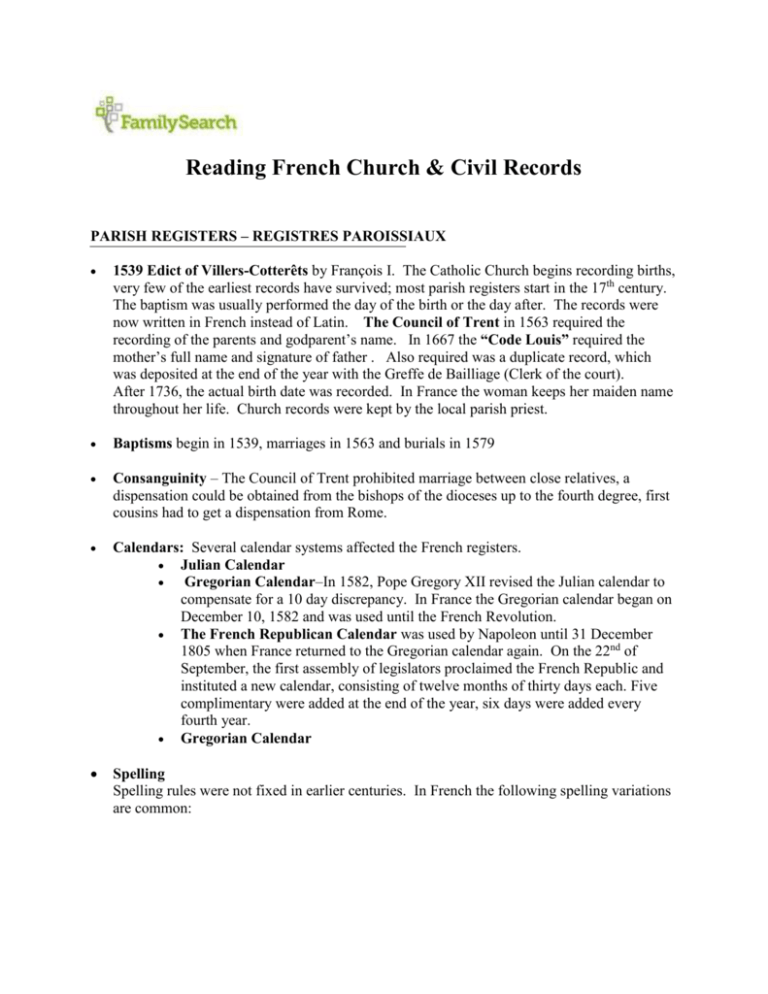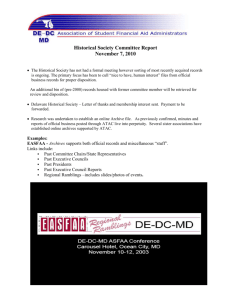Reading French Church & Civil Records
advertisement

Reading French Church & Civil Records PARISH REGISTERS – REGISTRES PAROISSIAUX 1539 Edict of Villers-Cotterêts by François I. The Catholic Church begins recording births, very few of the earliest records have survived; most parish registers start in the 17th century. The baptism was usually performed the day of the birth or the day after. The records were now written in French instead of Latin. The Council of Trent in 1563 required the recording of the parents and godparent’s name. In 1667 the “Code Louis” required the mother’s full name and signature of father . Also required was a duplicate record, which was deposited at the end of the year with the Greffe de Bailliage (Clerk of the court). After 1736, the actual birth date was recorded. In France the woman keeps her maiden name throughout her life. Church records were kept by the local parish priest. Baptisms begin in 1539, marriages in 1563 and burials in 1579 Consanguinity – The Council of Trent prohibited marriage between close relatives, a dispensation could be obtained from the bishops of the dioceses up to the fourth degree, first cousins had to get a dispensation from Rome. Calendars: Several calendar systems affected the French registers. Julian Calendar Gregorian Calendar–In 1582, Pope Gregory XII revised the Julian calendar to compensate for a 10 day discrepancy. In France the Gregorian calendar began on December 10, 1582 and was used until the French Revolution. The French Republican Calendar was used by Napoleon until 31 December 1805 when France returned to the Gregorian calendar again. On the 22nd of September, the first assembly of legislators proclaimed the French Republic and instituted a new calendar, consisting of twelve months of thirty days each. Five complimentary were added at the end of the year, six days were added every fourth year. Gregorian Calendar Spelling Spelling rules were not fixed in earlier centuries. In French the following spelling variations are common: Variation bv used for c used for ct used for es used for i used for o used for os used for sç used for t used for y used for y used for z used for v ss t é j ou ô s tt I ill s Example février spelled aussi spelled faites spelled témoins spelled jour spelled tournier spelled nôtre spelled savoir spelled cette spelled hier spelled filleul spelled baptize spelled febvrier auci faictes tesmoins iour tornier nostre sçavoir sçavoir hyer fyeul baptize CIVIL REGISTRATION - REGISTRES D’ETAT CIVIL 1792 Civil Registration began after the French Revolution. These records are very complete and provide: maiden name of the mother, names of the parents of the brides and grooms, ages and residence of witnesses etc. If parents are deceased date and place of death is given. The priests continued to keep church records, the civil authorities kept their own records of births, marriages and deaths. A law passed in 1798 (year VI of the French Republic) which required citizens to be married at the canton seat (chief-lieu de canton) instead of the local town (commune). This law was abolished in 1800 when couples were again allowed to marry in their local town. For this reason, marriages for the years VII and VIII (1798-1800) are usually missing from town records. Margin entries (mentions marginales) From 1897, the birth records include what are called 'margin entries' which state subsequent events of the individual : From 1897 - marriages From 1939 - divorces From 1945 - deaths From 1958 - legal separations Tables décennales are alphabetical indexes to the births, marriages and deaths every ten years. Some civil records have indexes at the end of each year. The last hundred years of civil registration in France are confidential except for direct line ancestors. Many of the Departments have digitized their records and put the records online. http://www.francegenweb.org/~archives/archivesgenweb/ Sources Paris registers Civil registration Civil registration Time period covered 1539 – 1792 1792 - 1915 1912 - 2012 Location of registers Departmental Archives Departmental Archives Mairie (City Hall) Abbreviations Les sigles généalogiques ° ou o Naissance ö Né et baptisé (°) Naissance illégitime b Baptisé °+ Mort-né P Père M Mère p Parrain m Marraine fs Fils fa Fille (x) Fiançailles x Mariage x2, x3 Remariages : 2e mariage... Cm Contrat de mariage not. Notaire + (+) obs. inc. vf vve ttt desc. s.p. s.a. s.a.a. s.a.p.r. rel. cat. rel. prot. rel. ort. rel. isr. Décès inhumation Obsèques Incinéré Veuf Veuve Testament Descendance Sans postérité Sans alliance Sans alliance actuelle Sans alliance, mais avec postérité reconnue Religion catholique Religion protestante Religion orthodoxe Religion israélite -x- union illégitime rel. mus. Religion musulmane )( t N Divorce témoin Inconnue c !1800 av. ou < Cité le cité en 1800 Avant ? Douteux ap ou > Après Sg Signature /1750 Avant 1750 Sx Sexe 1700/ Après 1700 Psse Paroisse ca du latin circa, environ archives nationales AN archives départementales AD archives ecclésiastiques AE archives hospitalières AH archives municipales AM archives communales AC bibliothèque Nationale BN bibliothèque bibl. fonds (d'archives) fds Registres de catholicité RC For help with French handwriting: Records onlineBYU handwriting FHFRA 73 - France: Reading French Handwriting Handwriting Manuel http://script.byu.edu/french/fr/bienvenue.aspx Reading French Records (3 lessons) https://www.familysearch.org/learn/researchcourses Paléographie http://fr.geneawiki.com/index.php/Pal%c3%a9ographie Handwriting course online by Stéphane Poullau http://www.stephanepouyllau.org/ (13 lessons) Apprendre à lire les Archives, Gérard D’Arundel de Condé, Edition Christian, Paris, 1993 Order civil records online for the last 100 years if you are a direct descendant https://www.acte-etat-civil.fr/DemandeActe/Accueil.do You can request a birth, marriage or death record online for someone who was born in France or in one of the oversee departments, it will then be mailed to you 1. Find your town and department 2. Accept the conditions of service 3. Choose the record type and state your relationship to the person 4. Provide address, email






